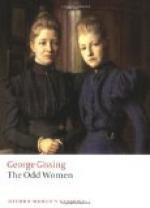’Yes. It’s very sad. I must bear up under it. The worst of it is, I am naturally subject to depression. In solitude I sink, sink. But the subject is too painful. Don’t let us darken the last hours with such reflections.’
Widdowson retained his indulgent opinion of the facetious young wine merchant. He even laughed now and then in recalling some phrase or other that Bevis had used to him.
Subsequently, Monica had several long conversations with the old lady. Impelled to gossipy frankness about all her affairs, Mrs. Bevis allowed it to be understood that the chief reason for two of the girls always being with their brother was the possibility thus afforded of their ’meeting people’—that is to say, of their having a chance of marriage. Mrs. Cosgrove and one or two other ladies did them social service.
‘They never will marry!’ said Monica to her husband, rather thoughtfully than with commiseration.
‘Why not? They are nice enough girls.’
’Yes, but they have no money; and’—she smiled—’people see that they want to find husbands.’
’I don’t see that the first matters; and the second is only natural.’
Monica attempted no rejoinder, but said presently—
’Now they are just the kind of women who ought to find something to do.’
’Something to do? Why, they attend to their mother and their brother. What could be more proper?’
‘Very proper, perhaps. But they are miserable, and always will be.’
’Then they have no right to be miserable. They are doing their duty, and that ought to keep them cheerful.’
Monica could have said many things, but she overcame the desire, and laughed the subject aside.
CHAPTER XVII
THE TRIUMPH
Nor till mid-winter did Barfoot again see his friends the Micklethwaites. By invitation he went to South Tottenham on New Year’s Eve, and dined with them at seven o’clock. He was the first guest that had entered the house since their marriage.
From the very doorstep Everard became conscious of a domestic atmosphere that told soothingly upon his nerves. The little servant who opened to him exhibited a gentle, noiseless demeanour which was no doubt the result of careful discipline. Micklethwaite himself, who at once came out into the passage, gave proof of a like influence; his hearty greeting was spoken in soft tones; a placid happiness beamed from his face. In the sitting-room (Micklethwaite’s study, used for reception because the other had to serve as dining-room) tempered lamplight and the glow of a hospitable fire showed the hostess and her blind sister standing in expectation; to Everard’s eyes both of them looked far better in health than a few months ago. Mrs. Micklethwaite was no longer so distressingly old; an expression that resembled girlish pleasure lit up her countenance as she stepped forward; nay, if he mistook not, there came a gentle warmth to her cheek, and the momentary downward glance was as graceful and modest as in a youthful bride. Never had Barfoot approached a woman with more finished courtesy, the sincere expression of his feeling. The blind sister he regarded in like spirit; his voice touched its softest note as he held her hand for a moment and replied to her pleasant words.




